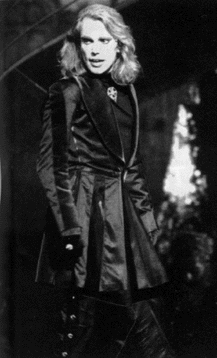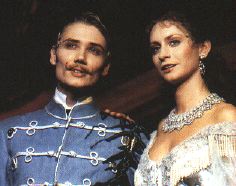Elisabeth
Original Vienna Cast


I adore this album. The score, the story, above all, the cast. I first got a copy because Pia Douwes, my favourite Fantine, plays Elisabeth, but it didn't take long for me to fall in love with the show and her costars (especially Ethan Freeman and, of course, Uwe Kröger, although there's no one on this recording I don't like) as well. I shall try and just give an overview of the album, because if I were to discuss each track, I wouldn't know when to stop. :) Anyone interested in an English-language synopsis should basically just read the "history" section of the Elisabeth Mailing List FAQ, which is about the historical Elisabeth but was written with the musical in mind.
Overall, the music is light rock, but very melodic and theatrical. The show requires a lot from its lead performers....Sisi and Franz Joseph age nearly 45 years, der Tod's supernatural, and Lucheni's narrating the life story of someone he despised for what she represented, yet he can't turn the audience against her too much, or too soon. And in general, this cast certainly seems to meet those challenges with ease. (The main exception being Viktor Gernot, whose vocal performance as Franz Joseph lacks just one thing: aging. Or, rather, youthening. He sounds at 21 the same way he does at 60+, which can be confusing; for the longest time I thought that was Duke Max, Sisi's father, during So wie man denkt, so kommt es nie, not the young Franz Joseph! Based on the TV clips I've seen, though, his physicality did reflect the appropriate aging.) It's possible performances changed before the show's opening--the recording was made in May-July 1992, if I'm reading the liner notes correctly, and the show didn't open until September of that year.
The CD's Prolog is missing the entrance of der Tod (Uwe Kröger), unfortunately, but does introduce Ethan Freeman's fabulous Lucheni quite well. Throughout the album, Freeman's voice contains subtle shadings that help convey his meaning even to those of us who don't speak German.
 Sisi (the incomparable Pia Douwes) makes her entrance in the second song, Wie du, along with her father (Wolfgang Pampel). She's only fifteen, and Douwes does a tremendous job of sounding young, sweet, wistful--just the opposite of the way she'll end up.
Sisi (the incomparable Pia Douwes) makes her entrance in the second song, Wie du, along with her father (Wolfgang Pampel). She's only fifteen, and Douwes does a tremendous job of sounding young, sweet, wistful--just the opposite of the way she'll end up.
The next highlight for me is So wie man denkt, so kommt es nie, where Franz Joseph meets and falls in love with Sisi instead of her elder sister. The chorus is catchy, and gives Freeman in particular some fun chances to play around.
Skipping ahead a couple of songs, we come to one of my absolute favourites: Der letzte Tanz. This is Kröger's first entrance on the recording, and what a way to begin! It's a sultry, seductive, and increasingly rock (without going overboard, at least, not in this rendition--other recordings, even by Kröger, aren't nearly as good) song, and in my experience, one of the most instantly likeable songs from the show.
Ordinarly, I probably wouldn't mention Eine Kaiserin muss glänzen, but I can't resist. I love the way Douwes, as Sisi is dragged out of bed at 5AM, sounds so tired...and then how her voice cuts through those of Else Ludwig, Isabella Fritdum, and Marika Lichter.
Ich gehör nur mir is essentially a pop song, but an excellent one. And fabulously performed by Douwes, as always....In addition to the smile in her voice as she talks about wanting to walk tightropes and go out on the ice, the wonder of finding herself in the stars, the warning not to tie her up--all while sounding like a sixteen-year-old--she proves once again that she's got quite a belt!
There are so many reasons to like Elisabeth, mach auf mein Engel....The longing of Franz Joseph (Viktor Gernot) for his wife; her pain and anger at the way their son's tutors are allowed to treat him, and her determination to free him--and herself--whatever the cost; der Tod's tender offer to comfort her, and simple yet moving declaration of love; her summary rejection of him....*sigh*
That leads into a fabulous ensemble number, Milch. The first several lines are especially interesting, albeit hard to describe. Although the ensembles on the other recordings are also excellent, this remains my favourite version of this song, thanks to Freeman. Just can't beat his "Ja!"s. :) I find it also serves as a great way to get people interested in hearing the rest of this score.
Lucheni's only full solo opens act two; Kitsch is kind of techno in a way, I suppose, but Freeman has such fun with it that it's impossible to resist. Besides, no one does the opening section--before the techno part--nearly as well. And actually understanding the title the first time I heard the song was nice, too. :)
Rastlose Jahre's one of those scenes that tends to get stuck in one's head. I like the blending of the different themes...there's the members of the court, men and women separately gossiping about Elisabeth's constant travelling; Franz Joseph's letters to his "poor angel"; Lucheni relishing the fact that she's growing old, and is no longer the beauty she was famous for being....Admittedly, the "hunt" portion of the track, while musically effective, is something I occasionally grow tired of and skip--not least because the next track is another of my particular favourites!
 Die Schatten werden länger....Another incredible song for Kröger, along with Andreas Bieber as Crown Prince Rudolf. It's another of the show's more rock songs--in keeping with the creators' view of "death as a rock star"--but still very powerful, in addition to well sung. Unfortunately, it's also hard to describe.
Die Schatten werden länger....Another incredible song for Kröger, along with Andreas Bieber as Crown Prince Rudolf. It's another of the show's more rock songs--in keeping with the creators' view of "death as a rock star"--but still very powerful, in addition to well sung. Unfortunately, it's also hard to describe.
The adult Rudolf's only other song is a solo (mostly--Elisabeth comes in towards the end) called Wenn ich dein Spiegel wär. It's a song that took a while to grow on me, but which I now really like. It's very moving, too; about Rudolf's need for his mother to recognise how similar they are and to take an interest in him, something she only did once in his life (back in Mach auf, when she rescued him from a sadistic head tutor) but which made a huge impression on the boy. Immediately after this song, he kills himself (and his seventeen-year-old mistress).
Elisabeth's Totenklage normally might not rate a mention in and of itself, being a relatively minor song, but Douwes's performance is worth noting. Unlike many singers, she's not afraid to sound bad musically for the sake of her acting; she sounds like she's been crying for hours, if not days...her voice is appropriately hoarse, and she doesn't always hit the notes cleanly. It's wonderful. Her self-blame for Rudolf's death is followed by a plea to der Tod to take pity on her, and take her away at last; he flings her earlier rejection of him back in her face.
Boote in der Nacht is a duet between Sisi and Franz Joseph, a reprise of an earlier song not on this recording in which they declared that nothing would be difficult as long as they were together, and begged the other not to leave them alone. Now, however, nearly fifty years later, things have changed; Elisabeth tells him that it's time they admitted that they could never be happy together, because their goals were too different and she couldn't be the person he needed her to be.
The show ends with Der Schleier fällt, der Tod's claiming of Elisabeth at last after Lucheni has killed her (in Geneva, on 10 September 1898). It's the only time on this recording when the two of them really sing *together*, rather than the entreaty/rejection nature of their other two encounters on the album, and it would be wonderful to hear for that alone, as Douwes and Kröger are among my five favourite singers....Having the two of them together makes an impressive ending for the show and the recording, as well. :)
All in all, this particular recording can't be recommended enough! Everyone I've forced to listen to it, either directly or through sending copies (whole or just excerpts), has been pleasantly surprised, even though most of them started out wary of a show that hadn't been done in English yet!
In his Musical-Jahrbuch 1998, Andreas Luketa has this to say about the original cast:
The original cast album of 1992 presents a dream cast. Pia Douwes shines as the powerfully-voiced Elisabeth; Uwe Kröger, in the role of his life, makes der Tod unforgettable and fascinates vocally and through his portrayal of completely androgynous eroticism. Ethan Freeman performs Luigi Lucheni with strong pipes and a pointed interpretation, while Andreas Bieber as Rudolf moves the listener with a lot of feeling. In the role of the Emperor Franz Joseph, Viktor Gernot is convincing. With its full orchestra sound under the direction of Caspar Richter, the Orchester der Vereinigten Bühnen Wien proves once again that it has nothing to fear from comparisons with internationally-known orchestras.(Translation mine; corrections welcomed!)